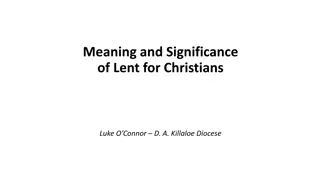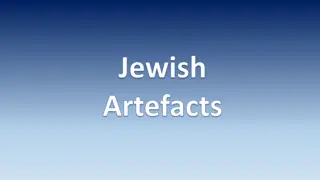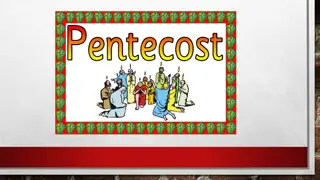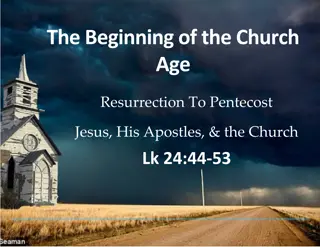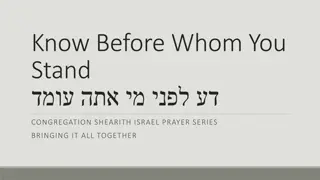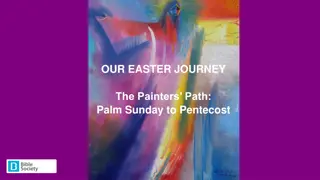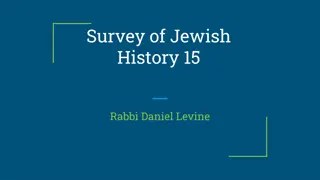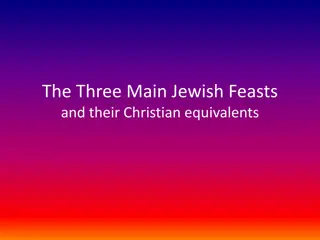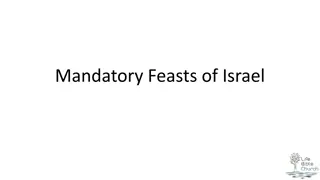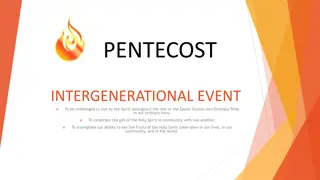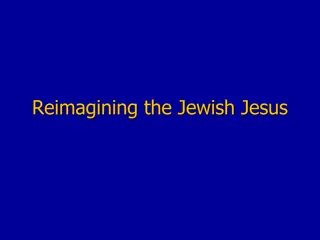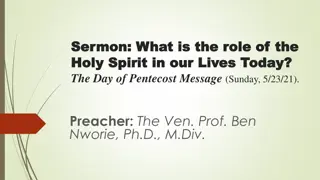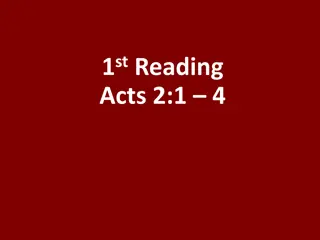The Significance of Pentecost in Jewish and Christian Traditions
The three annual feasts of the Jews - Passover, Pentecost, and Feast of Tabernacles - held deep religious significance, with Pentecost being the 50th day after Passover. This day was pivotal in history, marking important events for both Jews and Christians. Pentecost was a time of harvest, giving of the law, and ultimately, the birth of the Christian church with the empowerment of the Holy Spirit.
Download Presentation

Please find below an Image/Link to download the presentation.
The content on the website is provided AS IS for your information and personal use only. It may not be sold, licensed, or shared on other websites without obtaining consent from the author. Download presentation by click this link. If you encounter any issues during the download, it is possible that the publisher has removed the file from their server.
E N D
Presentation Transcript
The Jews Had Three Annual Feasts Passover (a.k.a. The Feast of Unleavened Bread ) Commemorated God s deliverance from Egyptian bondage Pentecost (a.k.a. The Feast of Harvest ) Celebrated the beginning of the harvest The Jews also observed it as the giving of the law at Mt. Sinai Feast of Tabernacles (a.k.a. The Feast of Ingathering ) Commemorated the sojourn in the wilderness These feasts were ordained by the Lord through Moses Ex. 23:14-17; cf. 34:18-23; Deut. 16:16 All Jewish males were to gather in Jerusalem for these occasions (Deut. 16:16-17)
The Day of Pentecost It had various names in the Old Testament The Feast of Weeks (Ex. 34:22; Deut. 16:10) The Feast of Harvest (Ex. 23:16) The Feast of Firstfruits (Ex. 23:16; Lev. 23:17; Num. 28:26) Pentecost was the Greek name given to the feast Pentecost means fiftieth Pentecost always came 50 days after Passover (Lev. 23:15-16) The day of Pentecost was a special day to the Jews All Jewish males were to gather in Jerusalem (Deut. 16:16) They were to make a freewill offering (Deut. 16:10, 16-17; Prov. 3:9) A day of holy convocation with no customary work (Num. 28:26) Special to this day was the wave offering (Lev. 23:15-20)
When the day of Pentecost had fully come Had fully come literally means was being fulfilled. This day of Pentecost was special and intentional. History was finally arriving at a point in time. God made this Pentecost the focal point of history (cf. Gal. 4:4). There were large crowds gathered in Jerusalem for this special day. Pentecost was one of the three annual feasts which Jewish males were required to attend (Deut. 16:16). There were dwelling in Jerusalem Jews, devout men, from every nation under heaven (Acts 2:5). It was the perfect day, time and setting for God to fulfill His grand purpose (cf. Eph. 3:10-11)
When the day of Pentecost had fully come Pentecost was always the first day of the week (Lev. 23:15-16) Sunday took on and sustains a special meaning to Christians Christ was raised from the dead (John 20:1). The Lord established His church in Acts 2. The early Christians always assembled (Acts 20:7). The Lord had specifically and intentionally chosen this day! No longer was the Sabbath a holy day (Col. 2:14-17) Interesting parallels between Jewish Pentecost & Christianity The full harvest of Christ s work as the Lamb of God came about The new law/covenant was given and proclaimed The first in-gathering of the gospel harvest occurred It was a day of joy and gladness
When the day of Pentecost had fully come Peter referred to Pentecost as the beginning (11:15): The promise of the power of the Holy Spirit to the apostles (John 14:26; 15:27; 16:13). The Great Commission becoming effective (Matt. 28:19-20; Mark 16:15-16; Luke 24:47). The new covenant (Heb. 8:6-8; 9:15-17; 10:9; 1:1-2). The preaching of the fullness of the gospel (Acts 2:22-36; 1 Cor. 15:1-4), including the resurrection and deity of Jesus. Salvation through Jesus Christ according to His conditions (Acts 2:36-41; 4:12; 8:12-13; John 3:3-5). The church (Acts 2:41, 47; Matt. 16:18-19; Eph. 1:3-23; 2:13-22; Col. 1:13-14).
Pentecost Was a Day of Great Things A Great Day (2:1) A Great Audience (2:5-11) Great Preachers (2:14, 42) A Great Sermon (2:22-36) A Great Question (2:37) A Great Answer (2:38) A Great Response (2:40-46) A Great Result (2:47)





